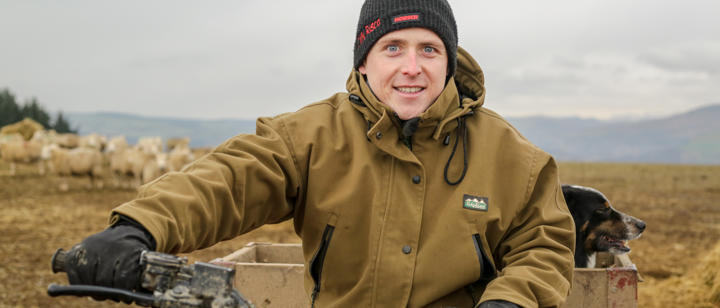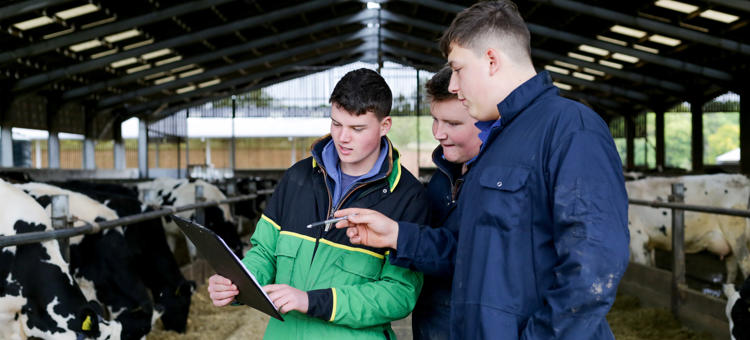Course Overview
An Agricultural Engineer services, diagnoses, repairs, tests, evaluates and provides technical support for customers and operators. With technology increasing in the land-based service sector, there's a wide range of career opportunities for a skilled and versatile engineer. This one-year course will develop your knowledge and practical skills across machinery operation, workshop skills, and engineering systems, to ensure you're well prepared for a technical role within the land-based service sector. You will also undertake a work placement of 150 hours to gain valuable experience in the industry.
What you will study
-
Health & Safety
-
Workshop Practises
-
Engine Operation Principles
-
Fabrication, Cutting & Joining
-
Hydraulics Systems
-
Land-based Vehicle Electrics
-
Land-based Machinery Operation
On completion, you'll be awarded a nationally recognised qualification and be ready to progress on to Further Education courses or employment within land-based engineering or the allied industries.
This one-year course will introduce you to the core knowledge and practical skills needed for a future in land-based engineering. You’ll study key areas including health and safety, workshop practises, engine operation principles, hydraulics, vehicle electrics, and land-based machinery operation. You’ll also develop essential workshop practices, as well as fabrication, cutting, and joining techniques, giving you the foundation to service, repair, and maintain machinery effectively.
Learning will be delivered through a balance of classroom theory sessions and hands-on practical training in our specialist workshops and on our commercial farm. You’ll work with real land-based machinery and equipment to develop your technical skills, while classroom learning will focus on the principles that underpin modern agricultural engineering. Group projects, individual assignments, and demonstrations from industry professionals will further support your development.
Assessment is through a combination of practical and written assignments that test your applied knowledge and technical ability. You’ll complete tasks such as machinery operation, diagnostics, and workshop-based projects, alongside written work to evidence your understanding of engineering systems. You'll also complete 150 hours of work placement.
On successful completion, you’ll be awarded a nationally recognised qualification that prepares you for further study or entry-level employment. Progression opportunities include:
- Level 3 study in Land-based Engineering or a related subject
- Apprenticeships in the land-based service sector
- Employment as a Workshop Assistant, Service Technician, or Machinery Operator within the land-based or allied industries
Course Overview
Course information
An Agricultural Engineer services, diagnoses, repairs, tests, evaluates and provides technical support for customers and operators. With technology increasing in the land-based service sector, there's a wide range of career opportunities for a skilled and versatile engineer. This one-year course will develop your knowledge and practical skills across machinery operation, workshop skills, and engineering systems, to ensure you're well prepared for a technical role within the land-based service sector. You will also undertake a work placement of 150 hours to gain valuable experience in the industry.
What you will study
-
Health & Safety
-
Workshop Practises
-
Engine Operation Principles
-
Fabrication, Cutting & Joining
-
Hydraulics Systems
-
Land-based Vehicle Electrics
-
Land-based Machinery Operation
On completion, you'll be awarded a nationally recognised qualification and be ready to progress on to Further Education courses or employment within land-based engineering or the allied industries.
What you’ll learn
This one-year course will introduce you to the core knowledge and practical skills needed for a future in land-based engineering. You’ll study key areas including health and safety, workshop practises, engine operation principles, hydraulics, vehicle electrics, and land-based machinery operation. You’ll also develop essential workshop practices, as well as fabrication, cutting, and joining techniques, giving you the foundation to service, repair, and maintain machinery effectively.
How you’ll learn
Learning will be delivered through a balance of classroom theory sessions and hands-on practical training in our specialist workshops and on our commercial farm. You’ll work with real land-based machinery and equipment to develop your technical skills, while classroom learning will focus on the principles that underpin modern agricultural engineering. Group projects, individual assignments, and demonstrations from industry professionals will further support your development.
How you’ll be assessed
Assessment is through a combination of practical and written assignments that test your applied knowledge and technical ability. You’ll complete tasks such as machinery operation, diagnostics, and workshop-based projects, alongside written work to evidence your understanding of engineering systems. You'll also complete 150 hours of work placement.
What can you do after this course?
On successful completion, you’ll be awarded a nationally recognised qualification that prepares you for further study or entry-level employment. Progression opportunities include:
- Level 3 study in Land-based Engineering or a related subject
- Apprenticeships in the land-based service sector
- Employment as a Workshop Assistant, Service Technician, or Machinery Operator within the land-based or allied industries
To study this course, you’ll need a minimum of three GCSEs at grade 4 or above, this must include English Language or Mathematics.
To apply, simply complete our Online Application Form. As part of the application process, you’ll be invited to have a telephone interview with a member of the course team.
You should expect some small costs for books and stationery. There will also be opportunities to take part in trips related to the topics you are studying. These trips incur a charge/are covered by the educational visits fee.
Students are required to pay a non-refundable educational visits fee at enrolment.
What’s the difference between Level 2 and Level 3?
Level 2 is designed as an introduction to agriculture and will give you the skills and confidence to progress to Level 3 study or entry-level roles in the industry. Level 3 goes into more depth and can lead on to university study, higher apprenticeships, or skilled employment.
Will I get practical experience?
Yes – all our agriculture diplomas combine classroom learning with hands-on training on our commercial farm. You’ll also complete regular work placements to build experience in the industry.
What can I do after completing a diploma?
Depending on your level, you could progress to further study (for example, Level 2 to Level 3, or Level 3 to university-level courses), start a higher apprenticeship, or move straight into employment in the agriculture sector.

Outstanding
Rated 'Ofsted Outstanding in all areas' for academic and curriculum-related provision

99.8% pass-rate
With a 99.2% BTEC pass rate (Hartpury College 2025), our outcomes for students are exceptional.

Living in on-site college accommodation at Hartpury, you’ll be part of a vibrant and international community of students of all ages who share their experience of life at college and university together on one campus.

The Hartpury Certificate is an enrichment programme designed to support our students to grow.


A-levels or a diploma?
Are you unsure about whether A-levels or a BTEC Diploma are the right choice for you? Find out the key differences and which qualification would best suit your learning style and your career and further study ambitions on our dedicated page.











